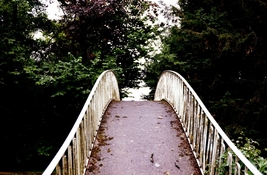 What does it mean for the arc of justice to bend toward the future for people with disabilities?
What does it mean for the arc of justice to bend toward the future for people with disabilities? The arc of justice bending over time asks us to look into the future. Theodore Parker, beloved Unitarian figure spoke these words, foreshadowing the Civil War. They have been used over and over to ask people to act in ways consistent with these imagined more just futures.
Look at the facts of the world. You see a continual and progressive triumph of the right. I do not pretend to understand the moral universe, the arc is a long one, my eye reaches but little ways. I cannot calculate the curve and complete the figure by the experience of sight; I can divine it by conscience. But from what I see I am sure it bends towards justice.
Sometimes when I do the looking at the world Parker called for, I figure that whatever he saw must have been an inkling, a possibility, perhaps the fostering of simple hopes in adverse conditions. People with disabilities may struggle with the imaginary that Parker proposed because we/they struggle so hard to be imagined in the present. Sometimes I relate to this imagination as the way my parents talked to me when I was little: “Of course I had to learn to tie my shoes. Who was going to do it when went to college?” They knew the ableism and barriers I would have to overcome, but their imagination gave reality and common sense to a future in which my gifts were maximized.
Disability studies scholar Lee Edelman asserts that disabled people would be better off refusing the future because it is always conceived as a new order in which disabled people do not have a place. Churches, fellowships, congregations, this word is for you. As you imagine bending that arc, slowly bending, making justice, the best we can conceive for our Beloved Community calls on you to expand the arc, not just to include disabled people that you choose to privilege, but rather to interrupt the assumptions about disability that you carry with you.
Yesterday, the Centers for Disease Control issued a report on disability. It states that one in five, or 53 million Americans, report having a disability. The report is tricky reading in that it frames able-bodiedness as required and disability as less or deficient. At the same time, some of the information is useful in the consideration of what it means to imagine a place for disabled people within the future of the arc of justice. Can you conceive of a future in which disabled people being part of Beloved Community is an essential element in living ethics and faith beyond ideas and into practice? This future is the antidote to a dead-end future that people often assign to people with disabilities, assuming that they aren’t capable of much anyway. (The report reifies this, for example, by offering a percentage for people, “having difficulty with independent living.” It is likely that the assertion of independent living is counter to the community values of interdependence and interconnectedness that Unitarian Universalists honor and practice.)
I invite you to a future that disposes of the old assumptions. I invite you to perceive with your heart the biases that have kept you from connecting with disabled people as individuals. I invite you to reject the common sense story that disability is undesirable. (I desire mine; it is part of me and brings who I am to you today.) I invite you to interrupt the future of no future, of not much going on, not much possible. Instead, we can breathe life into unexpected futures and new possibilities.
Look at the facts of the world. You see a continual and progressive triumph of the right. I do not pretend to understand the moral universe, the arc is a long one, my eye reaches but little ways. I cannot calculate the curve and complete the figure by the experience of sight; I can divine it by conscience. But from what I see I am sure it bends towards justice.
Sometimes when I do the looking at the world Parker called for, I figure that whatever he saw must have been an inkling, a possibility, perhaps the fostering of simple hopes in adverse conditions. People with disabilities may struggle with the imaginary that Parker proposed because we/they struggle so hard to be imagined in the present. Sometimes I relate to this imagination as the way my parents talked to me when I was little: “Of course I had to learn to tie my shoes. Who was going to do it when went to college?” They knew the ableism and barriers I would have to overcome, but their imagination gave reality and common sense to a future in which my gifts were maximized.
Disability studies scholar Lee Edelman asserts that disabled people would be better off refusing the future because it is always conceived as a new order in which disabled people do not have a place. Churches, fellowships, congregations, this word is for you. As you imagine bending that arc, slowly bending, making justice, the best we can conceive for our Beloved Community calls on you to expand the arc, not just to include disabled people that you choose to privilege, but rather to interrupt the assumptions about disability that you carry with you.
Yesterday, the Centers for Disease Control issued a report on disability. It states that one in five, or 53 million Americans, report having a disability. The report is tricky reading in that it frames able-bodiedness as required and disability as less or deficient. At the same time, some of the information is useful in the consideration of what it means to imagine a place for disabled people within the future of the arc of justice. Can you conceive of a future in which disabled people being part of Beloved Community is an essential element in living ethics and faith beyond ideas and into practice? This future is the antidote to a dead-end future that people often assign to people with disabilities, assuming that they aren’t capable of much anyway. (The report reifies this, for example, by offering a percentage for people, “having difficulty with independent living.” It is likely that the assertion of independent living is counter to the community values of interdependence and interconnectedness that Unitarian Universalists honor and practice.)
I invite you to a future that disposes of the old assumptions. I invite you to perceive with your heart the biases that have kept you from connecting with disabled people as individuals. I invite you to reject the common sense story that disability is undesirable. (I desire mine; it is part of me and brings who I am to you today.) I invite you to interrupt the future of no future, of not much going on, not much possible. Instead, we can breathe life into unexpected futures and new possibilities.
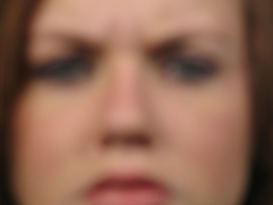
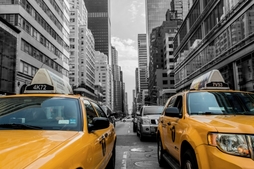
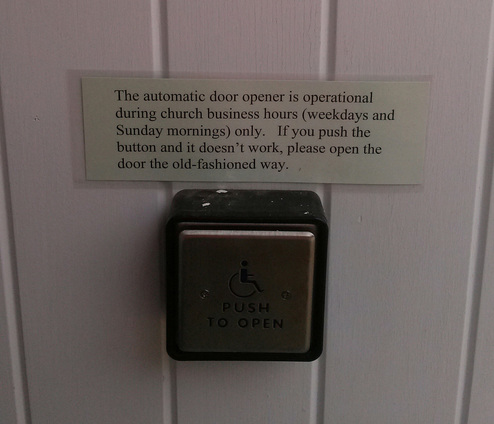
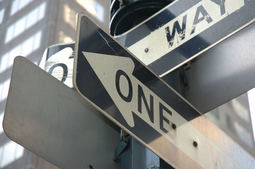
 RSS Feed
RSS Feed